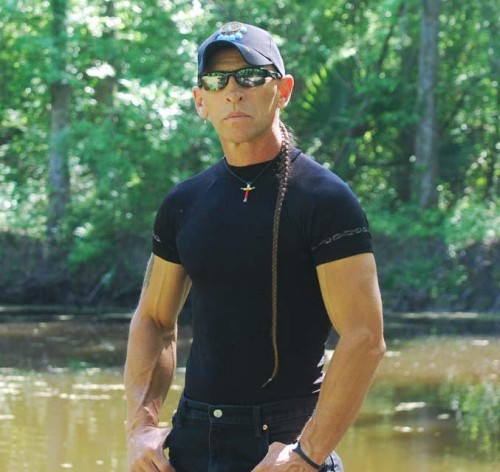Tuesday, April 5
April 5, 2011Ricky Prestenbach
April 7, 2011Down in Grand Bois, 500 feet south of the Bourg-Larose Highway, atop a pond nestled in the clearing of woods rests an alligator affectionately named after his aggressive nature.
“That’s P—ed Off,” said R.J. Molinere, a Native American, a hunter of alligator for more than three decades and a soon-to-be reality television star, of his four-foot long pet. “He’s just mad at everything. Anything that moves in that pond, he wants a piece of the action.”
In his 34th year of fishing alligator, Molinere brought along a camera crew for the History Channel’s hit reality show “Swamp People.” The 59-year-old member of the United Houma Nations will make his television debut Thursday night at 8 p.m.
The History Channel, in their want to expand the show’s perspective to include a Native American fisherman, contacted the United Houma Nations, who then approached Molinere. After confirming the details and ensuring the provision that his 22-year-old son and 20-year fishing partner would be included, Molinere accepted.
He has yet to be featured on what has since become a staple in his television rotation, but Molinere saw himself at work for the first time in the trailer hyping the second season.
“It’s fun watching yourself do what you do best,” he said “Last night, just the commercial I had seen, I had a big gator on my line and he was hung up on the bottom, and I didn’t realize what kind of danger…to me, it’s not danger because that’s what I do.”
Seeing himself sparked memories of emotion and action. Although he can’t offer specific details on the situation that was broadcast to the 3.9 million viewers who tuned into the season’s first episode until it airs, Molinere played the part of promoter and sold the moment.
“I could see him,” he recalled. “The water was clear, but I couldn’t get him up because he was hung up on a log, so I reached down there and I undid the line, and when I undid the line, he came flying up. And look, that was tight.”
Also a four-time 165-pound world arm wrestling champion, twice with the right arm and twice with the left, Molinere understands the importance of technique in competition. Ranging from preparation to feeding habits to wind and current direction to making the kill, Molinere relies on his experience to direct his approach.
“I have proof on my fireplace,” said Molinere as he explained why he hangs his line low above the water, a matter of debate for hunters who hang the bait at least 25 inches higher than he does. “I have got a 13-feet, 6-inch gator. Some people say the higher you go with the line, the bigger the gator. Not true. A big alligator didn’t get big by being stupid.
“When he’s coming for that line, he smells that bait, the only thing he’s got up is his eyes and his nose. All he wants to do is grab it and go hide. He doesn’t want no ripples, he doesn’t want to make no noise, he doesn’t want to let no other alligator hear him, because he wants to eat his meal alone.”
The competition is steep. Alligator hunters compete for leases and tags before the season opens. A state mechanism to monitor the hunting, the tags must be applied to the captured and killed alligators.
Failure is penalized through the tag system. If a hunter fails to utilize all his tags, it is likely he or she (a female hunter is featured on Swamp People) will be awarded less for the following season, increasing the importance not only for the immediate money but also for future welfare.
“The closer it gets to your first cold front, if you’re not done with your tags, you’ve got to start thinking about a lot of techniques that will work for you,” Molinere said. “You’ve got to fix a recipe that they can’t resist. You want to make that bait smell so bad that it will gag a maggot. You’ve got flies around you like you wouldn’t believe, and that will turn them on.”
An annual occurrence for 20 years, Jay Paul Molinere has long-sat in his father’s boat, absorbing the intricacies of alligator fishing so that he could continue the legacy and pass it down to his own son.
Seated on a boat on the Louisiana swamps while his father hunted an animal with the “bite of a pit bull and the energy of a great white shark,” wasn’t the safest place for Jay Paul to spend the Septembers of his youth, but R.J. said the decision to bring him along was organic.
“It was either go with a babysitter or come with me,” R.J. Molinere said. “Why send your kid with a babysitter when there ain’t nothing better than having your son with you? Some people might think it’s crazy to have your kid in a boat at 2-and-a-half to 3-years old, but to us, that just comes natural.”
Molinere made it abundantly clear he’s aware of what the people of his community think of him. On one hand, a barrage of text messages, phone calls and excited public encounters represent the positive response in lieu of his looming debut. Molinere said he had to pass his phone off to his wife last Thursday as friends and family hounded him for answers on when he would grace their screen.
He has also braced himself for the popularity that could arise from his endeavors on the family room centerpiece. “From what I hear from the other guys, you can’t really go to the store like I did a little while ago without having people [calling my name], so you have to prepare yourself because it could get like that.”
Regarding the other side of the community’s opinion spectrum, Molinere hesitantly admitted that he knows others aren’t as happy for his fortune. Some are jealous, and others are angry at the way the History Channel portrays southern Louisiana lifestyle to a national audience, fearing that it “makes us look dumb.”
“The people that is saying that, they are either haters or they are jealous. I don’t care what you do. You could do it perfect. They are still going to have a hater involved.
“It’s hard because you want to get back on the Internet and say all kinds of crazy stuff, but that’s what they want. When the fire gets hot, if you don’t put no more gas on it, the fire goes out. That’s why we don’t mess with that. We just let them talk, and if they see they get some attention, they’ll keep on. Just let it go. That’s what we say.”
Besides, Molinere doesn’t have time to worry about what others are saying. In addition to alligator hunting, Molinere lives off his family’s land n 500 acres in Grand Bois n by hunting deer and nutria, occasionally shrimping and trapping wild animals. He’s also training for a return to arm wrestling.
His absence from the sport that has taken him to Italy and Canada to win world championships was brought on by a lapse in focus. Molinere, after he thought he secured a quick pin, turned his attention to the referee while his opponent responded with a violent thrust. As Molinere tried to regain his grip, the torque on his right arm ripped the ligament off his bone.
Surgery will repair the arm, but the consequences would be much steeper if he loses his focus in the boat. He won’t admit that alligators are dangerous any more than acknowledging the sentiment as everyone else’s opinion, but his stance on approaching the animal offers a hint that deep down, he knows otherwise.
“I don’t look at an alligator like a dangerous animal,” he said. “Don’t get me wrong now, I respect them. It’s just like a motorbike. Once you lose your respect for a motorbike, it’s going to bite you. Same thing like an alligator, you lose your respect for him, you turn your back on him, he’s going to get you.”
R.J. Molinere, with his trademarked braided ponytail, stands in front of a pond on his brother’s property in Grand Bois. Molinere said his ponytail serves as an everyday reminder to himself and others that despite his light skin, he is proud of his heritage as a Native American. ERIC BESSON










